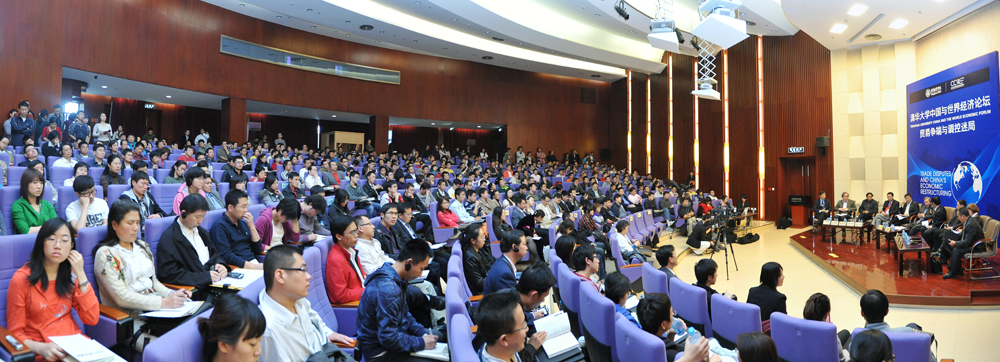No. 5 | Trade Disputes and Managing Uncertainties

On Oct 16, 2010, Tsinghua University CCWE successfully held its fifth forum focusing on the international trade disputes and how Chinese policy makers can manage uncertainties for the country’s continual growth. Crucial issues addressed at the forum include trades disputes and protectionism, RMB exchange rate, China’s twelfth five-year plan, post-crisis financial structure in the world, and real estate market bubbles. David Daokui Li, Director of CCWE and Member of the State Monetary Policy Committee, moderated the forum.
The deep-rooted issues underneath this forum are those pertinent to the sluggish world economy after the financial crisis. In contrast to the global economic slowdown, China has maintained marked growth and contributed to the world economic stability. At the same time, some developed countries, seeing their trade imbalances and tough domestic economic situation, tend to pressure China for RMB revaluation and wage a new wave of protectionism. Trade disputes and threats of sanctions put China to a crucial point of development and economic transition. How international pressures may impact the Chinese economy and its structural transition, what positive or negative effects the external challenges may produce on China’s further development, these formulated the central theme of this forum.
Forum panelists included Zhang Yansheng, Director, Macroeconomic Research Institute, NDRC, Tang Min, Associate Secretary General, China Development Research Fund, Xiang Songzuo, Associate Director, International Monetary Research Institute, Renmin Univ., Yi Xianrong, Institute of Finance and Banking, Chinese Academy of Social Sciences (CASS), Wang Jian, Executive Secretary General of China Society of Macroeconomics, Yuan Gangming, Institute of Economics, Chinese Academy of Social Sciences (CASS), and Francis Lei Dingming, Department of Economics, Hong Kong University of Science and Technology. Presented at the forum were also two international panelists, David Dollar, Economic & Financial Emissary to China, US Treasury Department, and Annika Melander, Head of Economic & Finance Section, Delegation of the European Union.
The forum panelists aired their voices and views from different perspectives on the Chinese and world economy. They debated on the cons and pros of the RMB re-evaluation to China and to the US economy. They indicated that appreciation of the RMB may not do good to the US imbalance of trade, on the contrary, it may do harm to the Chinese exporters. Pressure from outside China may, however, become a good opportunity for China to push ahead with reform of market-based RMB exchange mechanism and with the country’s transition of the economic structure. The consensus reached at the forum by the panelists are that pressing issues such as economic structure, development model, internal demand, fair distribution of wealth are among the most important priorities for the agenda of China’s twelfth five-year plan, as they are determining factors for the country’s sustained growth.
The forum also released the most recent economic forecast and analysis jointly done by Tsinghua CCWE and HKUST on the Chinese economy for 2010 and 2011, covering GDP growth, CPI trend, export and import, M2 supplies and capital investment. The study report predicts that China’s GDP growth in 2011 may drop to 9.17%, while CPI could rise above 3%. Foreign trade growth next year tends to be lower than that of 2010, and the capital investment growth in 2011 is anticipated to be at least 1.5% lower than 2010.
As a timely and effective platform, Tsinghua University has and will continue to invite extraordinary policy makers, experts and business leaders, domestic and international, to address current and long-term Chinese domestic issues amidst the international political and economic environment. The objectives of the forum are both to brainstorm/inform and to provide a good basis for policy debate and recommendations.




